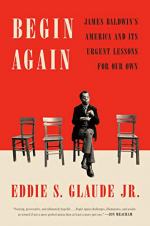|
This section contains 787 words (approx. 2 pages at 400 words per page) |

|
Begin Again: James Baldwin's America and Its Urgent Lessons For Our Own Summary & Study Guide Description
Begin Again: James Baldwin's America and Its Urgent Lessons For Our Own Summary & Study Guide includes comprehensive information and analysis to help you understand the book. This study guide contains the following sections:
This detailed literature summary also contains Topics for Discussion on Begin Again: James Baldwin's America and Its Urgent Lessons For Our Own by Eddie S. Glaude Jr..
The following version of the book was used to create this guide: Glaude, Eddie S., Jr. Begin Again: James Baldwin's America and Its Urgent Lessons for Our Own. Random House LLC, 2020.
In Begin Again: James Baldwin's America and Its Urgent Lessons for Our Own, Eddie S. Glaude Jr. examines the work and life of James Baldwin in order to understand America's present sociopolitical climate. In his introduction "Thinking with Jimmy," Glaude explains his evolved understanding of and relationship with Baldwin's writing. As a young student and activist, he feared studying Baldwin. During graduate school, however, Glaude discovered the continued truth and relevance of Baldwin's beliefs. In his opening pages, he lays out the central themes and interests of the chapters to come, and compels his reader to see the similarities between Baldwin's America and America today.
In Chapter 1: "The Lie," Glaude argues that America was founded on a system of lies, an architecture that defined whites as superior to all other racial identities. These harmful categorizations marginalized and oppressed black and brown communities. This was the lie against which activists of the mid-twentieth century were fighting. Glaude references Baldwin's early work to defend his theories, and shows how twenty-first century America is still living by the same principles.
In Chapter 2: "Witness," Glaude begins by telling the story of Dorothy "Dot" Counts. She was the first black student to attend Harding High School in Charlotte, North Carolina. Living in Paris at the time, Baldwin was moved by news of her bravery. In his writings, he says that Counts's story inspired him to return to America and rejoin the fight for racial justice and equality. Glaude points out the inaccuracy of Baldwin's claim, using the error to prove the effect of racial trauma on his memory. He argues that Baldwin's experience was not singular. Rather, his story was similar to those of all black Americans. Though the nation has attempted to ignore its violent past, the hurts she has caused have not gone away. In order to remediate these wrongs, Americans must acknowledge their fraught history.
In Chapter 3: "The Dangerous Road," Glaude discusses Baldwin's appearance at a 1968 Anaheim Disneyland Hotel fundraiser. During the event, Baldwin introduced Dr. Martin Luther King Jr. Rather than speaking about King, however, Baldwin fiercely attacked the country, exposing America's historic and continued betrayal of her black citizens. Glaude uses this event to discuss the differences between Baldwin and King's philosophies. Despite their differences, however, the two had a close connection. Baldwin saw King's assassination as the end of hope, and plunged into a state of subsequent despair.
In Chapter 4: "The Reckoning," Glaude compares Ronald Reagan's presidential campaign and election to that of Donald Trump's. Reagan's policies guised America's violent history in nostalgia, urging citizens to embrace a romanticized version of its past. These efforts effectively undid much of the civil rights movement's progress, and further marginalized black and brown communities. Glaude says the same is true of the Trump era. As with Reagan's America, Trump's America has unearthed a network of past ills and revitalized dangerous white supremacist ideologies and groups. Americans must look to Baldwin's writings from the 1980s to understand how to overcome the hazards of the Trump era.
In Chapter 5: "Elsewhere," Glaude describes Baldwin's move overseas. So distraught over America's failure to listen to its black citizens, Baldwin moved to Paris. He later lived in Istanbul as well. These physical locales provided Baldwin a safe distance from his country, and her oppressive society. Glaude says Americans must create a version of Baldwin's elsewhere at home, establishing new communities that emphasize peace and love.
In Chapter 6: "Ruins," Glaude considers how the black freedom struggle has impacted black citizens. Just as Baldwin was living in the ruins of the civil rights movement, so today's Americans are living in a similar state of ruin, one that effectively offers the possibility for change and renewal. He quotes Baldwin's writings to show his sustained hope despite his many struggles. Americans must embrace the same hopefulness in order to build a new future.
In Chapter 7: "Begin Again," Glaude describes his visit to Birmingham, Alabama in July of 2019. He took the trip in order to see social justice advocate Bryan Stevenson's Legacy Museum and National Memorial for Peace and Justice. Glaude describes his experiences at both the museum and memorial with vivid and affecting detail. He uses these sites as symbols for how Americans must confront their history and shape new sacred spaces.
In the conclusion, "A New America," Glaude directly addresses his audience, urging readers to examine their hearts and the truth of their history. He outlines a series of possible steps the individual might take to live in hope and love, and accomplish reform.
Read more from the Study Guide
|
This section contains 787 words (approx. 2 pages at 400 words per page) |

|



